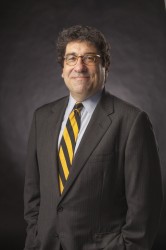
Chancellor Nicholas S. Zeppos (Vanderbilt)
Vanderbilt University and Vanderbilt University Medical Center (VUMC) are recognized throughout our country and around the globe as leaders in education, research, service to humanity and medical excellence.
We have long benefited from shared institutional goals and values. Bolstered by all ten colleges and schools sharing a single campus and a historic culture of excellence and collegial collaboration, we are recognized nationally and worldwide for our academics and research. Our success, for example, in biomedical research and education is inextricably linked to robust and highly integrated clinical, research and education programs.
Vanderbilt’s strong upward trajectory stems from the lessons learned throughout our distinguished history while simultaneously planning strategically for our bright future. This has positioned us advantageously to take actions that will bring even greater success and recognition in the future. By adapting to the changing health care environment, we can ensure that Vanderbilt University and VUMC not only continue, but also enhance their extraordinary service to the world and care of our patients.
Unlike many academic medical centers, VUMC is not a separately incorporated entity. Instead it is contained within the same legal and financial structure as Vanderbilt University. Fundamental changes in U.S. health care economics require us to reassess this structure. As VUMC continues to grow in excellence, it must adopt management structures and practices that enhance its ability to act nimbly and more independently in a rapidly changing health care environment. Similar changes have already occurred, or are being considered, at other national leading academic medical centers.
With this goal in mind and after a comprehensive yearlong study, Vanderbilt’s Board of Trust has directed the institution’s senior leadership to reconfigure VUMC as a not-for-profit academic medical center that is financially distinct from Vanderbilt University. However, the two organizations will remain tightly woven together by mission and the respected Vanderbilt name. The mission of VUMC will not change. It will continue to be the pinnacle of medical excellence, and be one of the world’s preeminent academic medical centers.
This evolution in structure will be seamless to most members of the Vanderbilt community and will help expand our presence geographically through our growing regional and statewide affiliates and partnerships. In a health care marketplace that is consolidating at an unprecedented rate and pace, it is essential that we position VUMC for continued growth and leadership in providing the highest quality patient care. This structure not only allows us to expand our distinctive services to the public, but further enables our capacity to train the next generation of clinicians and scientists, while propelling breakthroughs in research and patient care for our region as well as the larger global community.
Moving forward, VUMC will continue to fully support research and educational activities of the School of Medicine clinical departments, Graduate Medical Education (residencies and fellowships), and clinically related centers and institutes. At the same time, Vanderbilt University will play a greater role in supporting the M.D. and Ph.D. granting programs of the School of Medicine, its basic science programs, as well as the academic programs in the School of Nursing. Dr. Jeff Balser, as the leader of VUMC, will continue to serve as dean of the School of Medicine, and VUMC will continue to have seamless integration with the university in all present and future academic missions, programs and activities, including faculty appointments, teaching and research.
We are committed to ensuring that these changes in our financial structure and support activities do not impede the status and advancement of our faculty or the training of our students. We fully expect that these changes will not alter compensation or benefits for staff, faculty appointments, or the financial commitments to our outstanding academic and clinical programs. Further, this is not, and should not be construed as, an effort to reduce our workforce. Rather, we are setting a course that enables us to better adjust to the future of health care. We expect this process will take 12 to 18 months to complete.
We look forward to continuing to attract the best minds and the brightest ideas to a clinical center whose excellence will expand in the years to come. I am excited by these new changes and believe they will lead to an even brighter future for both Vanderbilt and VUMC, as we continue our historic work together while maintaining the values and the collaborative culture that make us great.
Sincerely,
Nicholas S. Zeppos
Chancellor